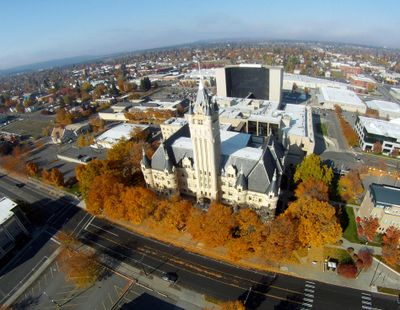Spokane lawmakers propose expanding county commission, electing by district

Three years after Spokane voters rejected increasing the number of politicians in county government, state lawmakers may require it anyway.
A proposal to add two Spokane County commissioners and to require those members be elected by a localized district rather than countywide is set for a hearing in Olympia on Tuesday morning. The bill, crafted by Rep. Marcus Riccelli, D-Spokane, has the support of lawmakers representing county voters on both sides of the aisle. But it’s drawn opposition from a majority of the sitting Spokane County Commission, including Commissioner Al French, who successfully campaigned to defeat a 2015 local ballot proposal that also would have expanded the county’s legislative and executive body.
“I’m not sure what is broken about the current system,” French said.
Spokane County lacks a charter, which means its commissioners are elected through a structure outlined in state law. In the August primary, voters in an individual commissioner district vote for a candidate who must live in that district. In the November general election, however, commissioners are elected countywide.
Riccelli’s bill changes that system, limiting ballots to district voters in both contests. The bill also mandates increasing the size of the panel from three to five members. Spokane County is the most populous county in the state to continue to vote for commissioners under the state system.
The bill would not take effect until the 2022 elections, following collection of the next U.S. census data, and would require only Spokane County to alter its representation.
Riccelli said the bill would allow Spokane County voters to have better representation on their county board.
“District elections will bring people closer to their representatives,” Riccelli said.
It would also allow commissioners to talk with each other without a public meeting, he said. Under state law, a majority of an elected board can’t meet without public notice; on a three-member board, that covers any meeting between two members.
Rep. Jeff Holy, R-Cheney, called the bill a way to “get out in front” of what he suspects will be a change in districting that could be mandated by the Voting Rights Act that has already passed the Senate and has support in the House. That bill, if it passes, could prompt a lawsuit challenging whether the existing districts fairly represent different groups and could result in a court redrawing lines.
“This is pre-emptive,” Holy said, adding that it’s a rare bill that has the support of the Republicans and Democrats that represent those three legislative districts.
The law also has bipartisan support at home. All members of the Spokane City Council signed a letter of support for a previous version of Riccelli’s bill that called for election of county lawmakers by district but did not require the panel to expand from three members to five.
City Councilwoman Candace Mumm led the effort to garner city signatures in support of the bill. Mumm, who vied unsuccessfully for a Spokane County Commission seat in 2015, said she hadn’t polled city lawmakers to see where they stood on the expansion of the commission but pointed out the measure had bipartisan support in Olympia, and that the city of Spokane went to a district-based system for its council elections in 2000.
City Councilman Mike Fagan, often the contrarian conservative vote on the panel, also signed the council’s letter of support for district-based elections.
“I didn’t really see anything wrong with the letter. I kind of like the idea of districtwide elections,” Fagan said.
French, along with fellow Spokane County Commissioner Mary Kuney, revisited arguments that were used to help sway voters more than two years ago that expansion was a bad idea.
“We just finished a very challenging budget process. Revenues for counties are becoming much more scarce,” French said. “This increases our cost about half a million dollars.”
Legislative analysts in Olympia reviewing a previous version of Riccelli’s proposal reported it was unclear how much it might cost to redraw district lines to accommodate for two new elected officials. Pierce County, which expanded to a seven-member county council system in 2012, spent $244,208 to redraw precincts and districts, but Spokane County is scheduled to go through that process already after the results of the new census.
French’s current colleagues remain split. Kuney echoed French’s concerns, including that it appeared state lawmakers were attempting to dictate the structure of local government. She pointed to the defeat of the ballot measure as evidence Spokane County residents didn’t want an expanded commission.
“I have a hard time when Olympia thinks they know better than our citizens,” Kuney said.
The proposition failed in 2015, with 55 percent of the vote against expansion.
Riccelli said he believes a major objection residents had at the time was a provision that the existing commissioners would draw the boundaries, possibly carving out safe districts for themselves.
The new bill requires open public meetings for the redistricting board, which would be appointed by legislators who are elected in districts wholly contained in the county.
Commissioner Josh Kerns, who broke with French and Kuney on the county’s budget by arguing cuts didn’t go deep enough, said Monday he was ambivalent about the addition of two lawmakers to the panel.
“I can see us operating under either system. I’m still going to do my job and focus on what’s important,” Kerns said.
He also said the county would be able to find a way to cover the costs of adding lawmakers, despite his objections to this year’s spending plan.
Staff writer Jim Camden contributed reporting.